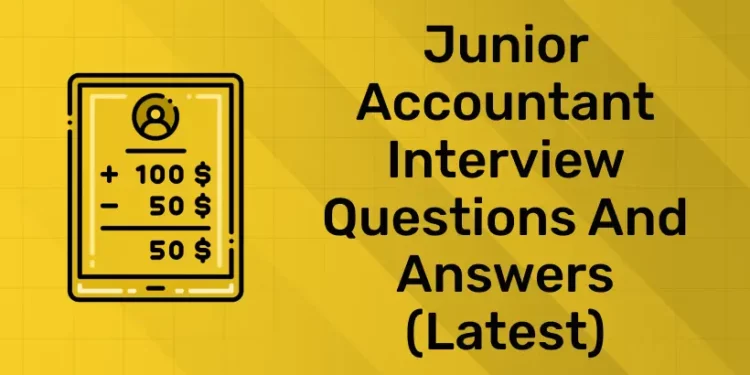Table of Contents
An interviewer will likely ask you about your background and professional experience as the interview progresses. They can ascertain your familiarity with particular accounting tasks by asking these questions. Answers that showcase your abilities, credentials, and the special situations in which you have used them might be used by future employers to assess your capacity for reproducing outcomes. You can anticipate the following questions of Junior Accountant about your history and experience from your interview.
Unlock Your Accounting Potential – Enroll in Our Comprehensive Course Today!
Introduction
A junior accountant is an entry-level role in an accounting department or company. Writing journal entries, updating financial records, monitoring accounts payable and receivable, processing payroll each month, and producing financial reports are just a few of a junior accountant’s duties.
A bachelor’s degree in accounting, finance, or a similar discipline is required as the lowest level of education for a junior accountant. Applicants who hold pertinent certifications or an associate’s degree may also be taken into consideration.
Junior Accountant Interview Questions and Answers
To find out how to act and what to wear to these important consultations, you should review fundamental interview best practices. You should study both general and specialised junior accountant interview questions to aid in the practice of your persuasive speeches. You can gain the confidence you need to truly impress the hiring manager with your expertise and amiability by practicing your responses to these common questions.
Q1. What actions have you recently done to improve your junior accounting skills?
Answer: In order to obtain my Certified Public Accountant credential, I began by reviewing my accounting knowledge and enrolling in the required courses. I also started going to workshops to assist me learn more about QuickBooks and other popular accounting software. I genuinely want to achieve in this field, so I know that in order to do so, I need to travel to conferences, attend workshops, and take classes.
Q2. What steps do you take to reduce the amount of errors in your work?
Answer: I understand the importance of the reports and statements I work on for the company, even as a young accountant. For this reason, before turning in any work, I make sure to check it one more time. I assisted in creating a spreadsheet that the whole team utilised at my previous employment as an assistant bookkeeper to verify work orders and other data. Everyone was able to produce more precise and effective results because to the spreadsheet, which was an excellent information source.
Q3. What makes you desire to work in the accounting field?
Answer: I’m an extremely detail-oriented individual who enjoys dealing with figures. While I was employed as a cashier in a boutique in my hometown, I had an early interest in the accounting field. I aided with record-keeping and other tasks on occasion because the boutique had just one bookkeeper. Although it wasn’t strictly an accounting role, it piqued my curiosity in the field. I believe I have what it takes to succeed in this kind of work, thus I want to be an accountant.
Q4. How does this job align with your professional objectives?
Answer: Since I took my first accounting course as a sophomore in high school, I have wanted to work in the accounting field. This junior accountant role seems like the ideal entry point into the field. I can obtain practical experience while pursuing my bachelor’s degree and further certifications. I’m interested in this employment, but I also think this organisation might help me have a successful career as a CPA and beyond. I would prefer to work for an organisation with a strong history, and this one is renowned for producing excellent accountants.
Q5. Do you have any experience with accounting software?
Answer: While my familiarity with QuickBooks is limited, my computer skills are excellent. Even though I may not have any prior expertise with accounting software, I am confident in my ability to quickly become familiar with the programmes. I believe that my proficiency with Excel and my understanding of HTML will translate to my ability to learn accounting software. Even while it might not transfer directly, it should at least make it easier for me to get started with the programme.
Q6. Which competencies do you believe a junior accountant should possess?
Answer: It is beneficial to be able to list the qualities you believe a junior accountant should possess since it demonstrates your comprehension of the position and the necessary skill set. Your response might highlight your familiarity with accounting concepts, software expertise, meticulousness, problem-solving prowess, teamwork, and communication abilities. Additionally, it might make you stand out from other applicants who might not be as knowledgeable about the company or the particular position they are seeking for. You can demonstrate your suitability for the job by emphasising your pertinent talents.
Unlock Your Accounting Potential – Enroll in Our Comprehensive Course Today!
Q7. How do you make sure your work is accurate?
Answer: It’s beneficial to be able to explain how you maintain accuracy in your work because it shows that you have an eye for detail, strong quality control abilities, and the capacity to generate correct financial reports. Your response might demonstrate your proficiency in locating and fixing mistakes in financial records—a critical skill for any junior accountant. It can also demonstrate your dedication to delivering excellent work and your sense of pride in your accomplishments. You may demonstrate that you are a capable and experienced junior accountant who is dedicated to generating accurate and error-free financial reports by giving concrete instances of how you assure correctness in your work.
Q8. Could you elaborate on your expertise with accounts receivable and payable?
Answer: Candidates have the chance to highlight their experience with accounts payable and accounts receivable in this question. Applicants can talk about their experience with managing collections, keeping accurate records, collecting payments, and sending invoices. Additionally, they can demonstrate their familiarity with the instruments, software, and accounting concepts utilised in the operations of accounts payable and accounts receivable. Effectively responding to this question can highlight a candidate’s attention to detail, ability to work under pressure, and ability to manage complicated financial chores. To prove their knowledge to potential employers, candidates should give concrete instances of their accomplishments and experience in this field.
Q9. How do you resolve disputes with managers or other team members?
Answer: Candidates must show that they can resolve conflicts in a professional manner because it is a necessary skill in any workplace. In response to this query, applicants ought to offer particular instances of conflicts they have faced and the ways in which they have handled them. They ought to talk about the ways in which they heard each other out, looked for areas of agreement, and collaborated to find a win-win solution. Emphasising the significance of retaining professionalism and a positive outlook throughout the conflict resolution process is crucial. Outlining how they took the situation’s lessons to heart and put preventative measures in place to avert such incidents in the future is also beneficial.
Q10. What kind of forecasting and budgeting experience do you have?
Answer: For a finance or accounting applicant, having experience with forecasting and budgeting is advantageous because it demonstrates their capacity to evaluate financial data, see trends, and make deft judgements to protect the company’s finances. Applicants with forecasting and budgeting experience can highlight their capacity for strategic thought as well as their ability to match financial plans with the aims and objectives of the business. Additionally, their increased familiarity with market dynamics and industry trends may facilitate data-driven decision-making.
Q11. Could you elaborate on your accounting software experience?
Answer: It can assist to differentiate you from other applicants who might not have as much experience in this field if you can briefly outline your experience with accounting software. By emphasising your familiarity with particular software packages, you may showcase your technical expertise and prove that you possess the abilities required to be successful as a junior accountant. It also demonstrates your adaptability and rapid acquisition of new software.
Q12. In what way do you remain current with developments in the accounting sector and regulations?
Answer: Explaining how you keep up with industry developments and accounting standards is beneficial since it shows that you are a dedicated professional who is eager to learn new things and advance in your career. You may demonstrate that you take your responsibilities as a junior accountant seriously and that you are proactive in your approach to professional growth by answering this question. Additionally, it can help you differentiate yourself from other applicants who might not be as familiar with recent laws and practices or who might not place as much emphasis on keeping abreast of changes in the field. You can demonstrate why you are an invaluable asset by emphasising your efforts to keep informed.
Q13. Are you familiar with creating financial statements? Which ones, if any, are they?
Answer: This question gives you, the candidate, a chance to highlight your financial statement preparation knowledge and expertise. Provide specifics regarding the financial statements you have prepared and your degree of engagement. You may also discuss any tools or software you have utilised in the preparation of financial statements. Giving instances of how you have applied financial statements to decision-making in business can also serve as proof of your skill and knowledge.
Q14. What kind of forecasting and budgeting experience do you have?
Answer: For a finance or accounting applicant, having experience with forecasting and budgeting is advantageous because it demonstrates their capacity to evaluate financial data, see trends, and make deft judgements to protect the company’s finances. Applicants with forecasting and budgeting experience can highlight their capacity for strategic thought as well as their ability to match financial plans with the aims and objectives of the business. Additionally, their increased familiarity with market dynamics and industry trends may facilitate data-driven decision-making.
Q15. What is the order in which you should reconcile accounts first?
Answer: Setting priorities for account reconciliation can be difficult, especially if there are several accounts that need to be balanced. In responding to this inquiry, it is critical to stress how crucial it is to rank the accounts according to how important they are to the company’s financial stability. This can entail giving high-risk accounts or those with a big influence on the financial statements priority. Talking about time management techniques and meeting deadlines, such making a timetable or using task management software, may also be beneficial.
Entri App’s Practical Accounting Course
The Practical Accounting course is designed to provide students with a comprehensive understanding of accounting principles and practices. The course covers everything from basic concepts to complex subjects and includes practical projects. Focusing on TallyPrime, Zoho Books Excel can help you develop valuable skills.
- The “Business Accounting & Finance Certification Programme” is a bridge curriculum created to help graduates of commerce succeed in careers in finance or accounting.
- Entri is eager to offer career guidance, interview preparation, soft skill training, and 100% placement aid.
- The Business Accounting and Finance Certification Programme is the greatest choice for individuals who wish to pursue careers in accounting or finance.
- The knowledge of banking, taxation, labor law, and corporate law is provided, with an emphasis on UAE Accounting & Finance.
Conclusion
It is a task to find the junior accountant. Using hiring tools is standard practice in the era of artificial intelligence and automation. You may come across junior accountants who are experts at crafting a CV or resume, but in order to confirm the information they put on paper, you’ll need an evaluation and integration tool for their skills. The purpose of the junior accountant assessment test is to assist you in selecting the best applicants for the position.
Unlock Your Accounting Potential – Enroll in Our Comprehensive Course Today!











